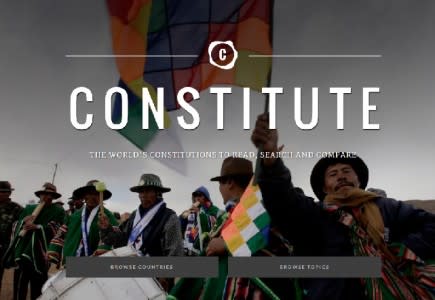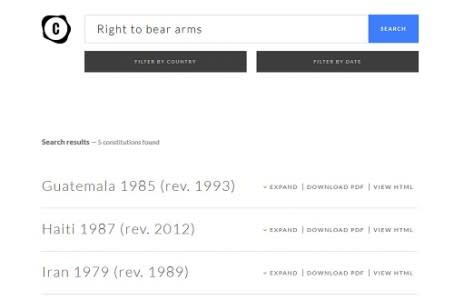Reading constitutional text does not have to be a miserable experience
The Constitute website from the Comparative Constitutions Project and Google Ideas has sparked a lot of news coverage in the past week. Zachary Elkins, one of the three scholars behind Constitute, takes us inside the process of looking at all the world’s constitutions, at once.
Some of us at the Comparative Constitutions Project and Google Ideas have launched a new resource for understanding constitutions. We call it Constitute. It’s a web application that allows users to extract excerpts of constitutional text, by topic, for nearly every constitution in the world currently in force. I thought I would follow up here with some more background and details about the project.
Constitute is built primarily for those engaged in the challenge of drafting constitutions, which occurs more frequently than some think (four or five constitutions are replaced each year and many more are revised in smaller ways).
Drafters often want to view examples of text from a representative set of countries—mostly so that they can understand the multiple dimensions of a particular area of law. Of course, scholars and educators will also find many uses for the data. After all, the resource grew out of an effort to study constitutions, not write them.
How does Constitute differ from other constitutional repositories? The core advantage of Constitute is the ability to view constitutional excerpts by topic.
These topics are derived from the conceptual inventory of constitutions that my collaborators and I have been developing and refining over the past 10 years as part of the Comparative Constitutions Project.
The intent of that project is to record the content of the world’s constitutions in order to answer questions about the origins and effects of various constitutional provisions.
In order to build that dataset, we invested quite a bit of time in identifying when constitutions in each country had been enacted, revised, or replaced; tracking down the texts associated with each of these changes; digitizing and archiving the texts; building the conceptual apparatus to extract information about their content; and finally, reading and interpreting the the texts. We leverage all of this information in building Constitute.
Another distinction of Constitute is the clarity and beauty of its reading environment.
We believe that constitutional interpretation is hard enough as it is. These texts should be presented in a clean typeset environment that facilitates and invites reading, not sleep and irritability (we speak from experience here).
We hope you enjoy the site and we welcome your comments and suggestions. We are already hard at work on version 2.0, which will include a nearly complete set of historical constitutions as well as access in multiple languages.
The sample currently includes those constitutions that are in force as of September 2013 in 177 countries. (For now, we omit a number of countries whose constitutions are built from multiple documents as well as those countries whose constitution is in transition. But look for additions from both of these categories shortly.)
We love the web interface that houses Constitute, but what matters are the constitutional texts that lie underneath its hood.
Soon, Constitute will be only one way to analyze these texts. We are opening various access points to the data and we look forward to accommodating scholars who would analyze the texts using various content-analytic methods. The data are structured as linked-open data, using Web 3.0 standards, which will allow for direct queries from R and other platforms from a SPARQL endpoint. The excerpts will be available for direct download as well, in multiple formats.
So, please visit and tell us what you think. Any comments or suggestions to the site should be directed to our project address, constitute.project@gmail.com.
The Comparative Constitutions Project (CCP) is directed by Zachary Elkins (University of Texas, Department of Government), Tom Ginsburg (University of Chicago, Law School), and James Melton (University College London), in cooperation with the Cline Center for Democracy at the University of Illinois. It was seeded with a grant from Google Ideas to the University of Texas at Austin, with additional financial support from the Indigo Trust and IC2.
Recent Constitution Daily Stories
Constitution Check: Does the federal government have a constitutional duty to stay open?
A look at Obamacare’s top constitutional challenges
The federal court system will feel shutdown pains
Constitution Check: Are benefits the key to equal marriage rights?



